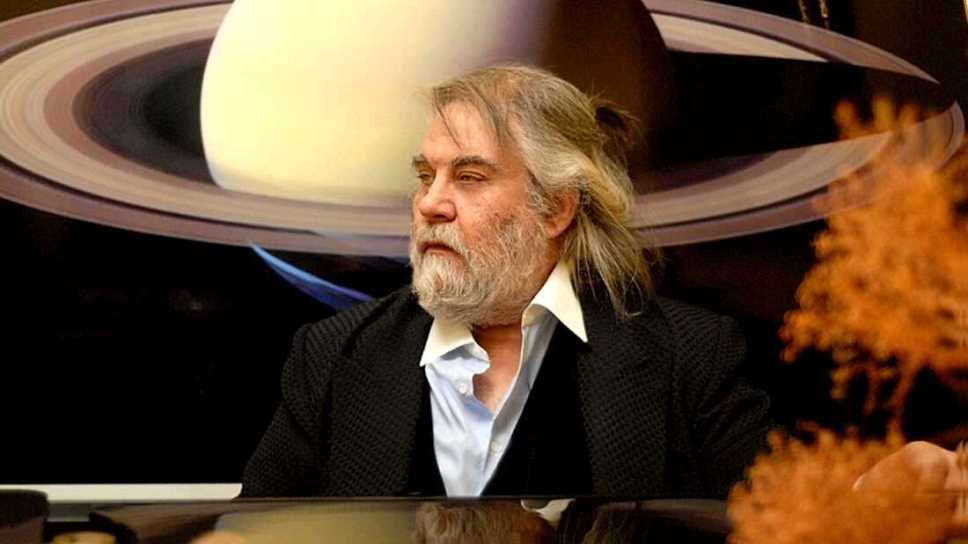The esteemed Greek composer Evangelos Odysseas Papathanassiou, best known to the world by his stage name of Vangelis has sadly passed away aged 79.
A self-taught musician, although Vangelis found fame as the keyboard player of prog rockers APHRODITE’S CHILD who were fronted by Demis Roussos, he first became known in Greece for writing a song called ‘Summer Dream’ which featured in the 1968 film ‘Operation Apollo’. While a member of APHRODITE’S CHILD, he composed a number of soundtracks including ‘L’Apocalypse des Animaux’ which accompanied a 1970 French documentary series directed by Frédéric Rossif.
After APHRODITE’S CHILD disbanded, Vangelis was invited by Jon Anderson to join YES to replace Rick Wakeman. Although he opted for what was to become a remarkable solo career, it was the beginning of a friendship that would lead to occasional collaborations and later, three unlikely hit singles in ‘I Hear You Now’, ‘I’ll Find My Way Home’ and ‘State Of Independence’.
Releasing his first album ‘Earth’ as Vangelis in 1973, his style involved him playing virtually everything including guitar, various ethnic instruments, drums and percussion. Relocating to London, he established his iconic Nemo Studios complex near Marble Arch. There he recorded 1975’s ‘Heaven & Hell’ to start what was to be a series of imperial albums. 1976 saw Vangelis’ first space themed long player ‘Albedo 0.39’, the key track of which was the cosmic ‘Pulstar’ whose stabby synth lines were later sampled by Gary Numan for the song ‘Strange Charm’ in 1986.
Vangelis’ wider breakthrough came with the 1977 album ‘Spiral’ and it was here that he debuted the Yamaha CS80. An incredibly complex synthesizer, the CS80 boasted a ribbon controller which allowed for the application of pitch-bends and glissandos polyphonically, while also boasting velocity-sensitive and after-touch qualities. He put these to effective use on ‘To The Unknown Man’, a three part piece over nine minutes which was to become one of his most captivating recordings. But while much of Vangelis’ work possessed a sedate symphonic quality, he proved he could funk it with the best of them on ‘Dervish D’, which utilised a spinning Roland System 100 sequencer core with a brilliantly played jazz-inflected solo.
In 1979, Vangelis was to present his best work yet in ‘China’; although he had not visited the country at the time of record, he became fascinated by its people and culture while observing a connection between ethnic Greek and Chinese music. Using traditional instruments and compositional styles alongside ring modulated synthesizers, ‘The Tao Of Love’ was to be the album’s centrepiece.
Vangelis was continuing to make his name in soundtracks and ‘Opéra Sauvage’ featuring the mighty ‘Hymn’ was to become his most successful album in the US to date. However, it was in 1981 with ‘Chariots of Fire’, the David Puttnam produced movie which told the story of two British athletes at the 1924 Paris Olympics that set him towards a lucrative career in cinema. Composed after watching three run throughs, the film’s opening ‘Titles’ with its iconic six note melodic phrase became an international hit single. The soundtrack won an Oscar for Best Original Music Score.
His next soundtrack for 1982’s ‘Blade Runner’ was to be his most celebrated work but also most troubled. Capturing the futuristic dystopian unsettlement of the story based on Philip K Dick’s ‘Do Androids Dream of Electric Sheep?’, although nominated for a BAFTA and Golden Globe as Best Original Score, Vangelis felt unable to issue a soundtrack album at the time of the film’s release due to creative differences with director Ridley Scott.
The magnificent ‘End Titles’ would not appear until 1989’s ‘Themes’ compilation, while the 1994 ‘Blade Runner’ album omitted much of the original music that appeared with previously unheard tracks such as ‘Rachel’s Song’ featuring the voice of Mary Hopkin now included; the evocative piece was later sampled by THE FUTURE SOUND OF LONDON for their single ‘My Kingdom’.
Rarely giving interviews, Vangelis’ preference for low profile made him an ideal film composer with ‘Missing’, ‘Antarctica’, ‘Bounty’, ‘Bitter Moon’, ‘The Plague’, ‘1492: Conquest of Paradise’, ‘Alexander’ and ‘Twilight of Shadows’ among his other movie credits.
Vangelis adopted a more classical approach on ‘El Greco’, ‘Mythodea – Music for the NASA Mission: 2001 Mars Odyssey’ and ‘The 2002 FIFA World Cup Official Anthem’ but following an inspirational video call with Dutch astronaut André Kuipers from the International Space Station, 2016’s ‘Rosetta’ saw a return to the electronic music to celebrate the European Space Agency probe launched in 2004 to perform a detailed study of comet 67P while flying past Mars and several asteroids along the way.
‘Nocturne: The Piano Album’ from 2019 was another recording inspired by Vangelis’ passion for space, while his final album ‘Juno to Jupiter’ in 2021 continued the theme with a work inspired by NASA’s mission with the Juno space probe to explore Jupiter, featuring opera star Angela Gheorghiu as the “voice” of Juno.
Vangelis leaves behind a vast legacy with some of the best electronic instrumental music ever recorded.
Text by Chi Ming Lai
19th May 2022


Follow Us!